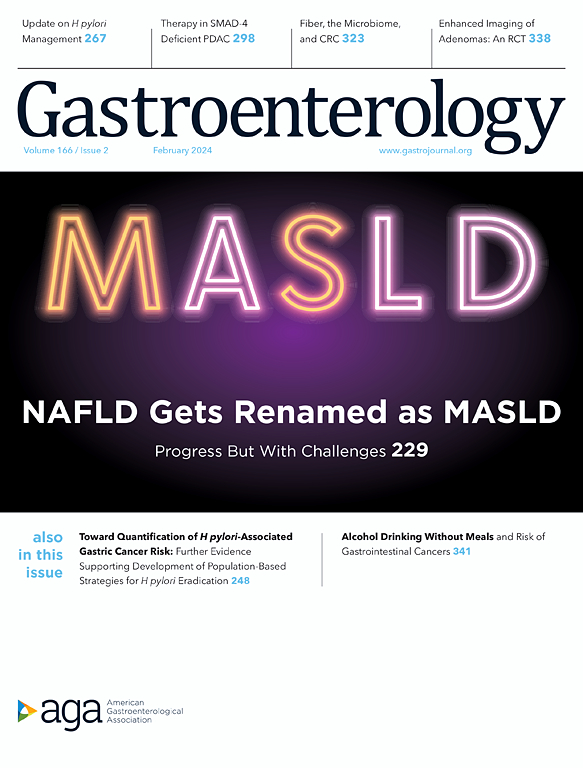AGA研究所肠易激综合征质量指标开发
IF 25.7
1区 医学
Q1 GASTROENTEROLOGY & HEPATOLOGY
引用次数: 0
摘要
对“肠易激综合征”或“IBS”进行了全面的PubMed检索,以确定2012年至2022年间发表并于2023年11月更新的国家和国际指南、临床实践更新和共识声明。共审查了20,684篇文章标题和摘要。非英语语言的文章和没有明确指导方针或共识声明的文章被排除在外。评估了多种诊断和治疗干预措施,包括结肠镜检查、粪便检查、血清学检查、影像学检查、饮食治疗、益生菌、药物治疗和脑-肠行为治疗。表1总结了肠易激综合征诊断和管理的质量指标,以及社会推荐的力度。讨论和未来方向AGA质量委员会审查了关于肠易激综合征流行病学、诊断和管理的国家和国际社会指南和共识声明,并根据迄今为止的现有证据制定了质量指标。质量指标使临床医生、实践和卫生系统能够将重点放在以证据为基础的护理方面,并得到多个专业协会的支持,以促进指南认可的护理,并在需要时实施以知识为目标的干预措施。作者要特别感谢David Godzina和AGA质量委员会成员的工作,他们参与了这些质量指标的生成和评估。作者还感谢罗马基金会理事会对这些质量指标的反馈和认可。洪伟雄:构思、起草、审稿/编辑。David A. Leiman:构思、起草、审查/编辑。Archana Kaza:概念化,审查/编辑。Rabindra本文章由计算机程序翻译,如有差异,请以英文原文为准。
AGA Institute Quality Indicator Development for Irritable Bowel Syndrome
Section snippets
Quality Indicator Development
A comprehensive PubMed search was performed for the terms “irritable bowel syndrome” or “IBS” to identify national and international guidelines, clinical practice updates, and consensus statements published between 2012 and 2022 and updated in November 2023. A total of 20,684 article titles and abstracts were reviewed. Articles in non-English languages and those that did not have clear guideline or consensus statements were excluded.Recommendation statements from 42 guidelines, clinicalQuality Indicators
Multiple diagnostic and therapeutic interventions were evaluated, including colonoscopy, stool-based tests, serologic tests, imaging studies, dietary therapy, probiotics, medications, and brain–gut behavior therapy. Table 1 summarizes quality indicators for diagnosis and management of IBS and the strength of recommendation by society, when available.Discussion and Future Directions
The AGA Quality Committee reviewed national and international society guidelines and consensus statements on the epidemiology, diagnosis, and management of IBS and developed quality indicators based on available evidence to date. Quality indicators allow clinicians, practices, and health systems to focus on aspects of care that are evidence-based and supported by multiple professional societies to promote guideline-endorsed care and, when needed, to implement interventions with the goal ofAcknowledgments
The authors would like to particularly acknowledge the work of David Godzina and members of the AGA Quality Committee who participated in generating and evaluating these quality indicators. The authors are also grateful for the Rome Foundation Board for their feedback and endorsement of these quality indicators.Author Contributions
Kenneth W. Hung: conceptualization, drafting, review/editing. David A. Leiman: conceptualization, drafting, review/editing. Archana Kaza: conceptualization, review/editing. Rabindra求助全文
通过发布文献求助,成功后即可免费获取论文全文。
去求助
来源期刊

Gastroenterology
医学-胃肠肝病学
CiteScore
45.60
自引率
2.40%
发文量
4366
审稿时长
26 days
期刊介绍:
Gastroenterology is the most prominent journal in the field of gastrointestinal disease. It is the flagship journal of the American Gastroenterological Association and delivers authoritative coverage of clinical, translational, and basic studies of all aspects of the digestive system, including the liver and pancreas, as well as nutrition.
Some regular features of Gastroenterology include original research studies by leading authorities, comprehensive reviews and perspectives on important topics in adult and pediatric gastroenterology and hepatology. The journal also includes features such as editorials, correspondence, and commentaries, as well as special sections like "Mentoring, Education and Training Corner," "Diversity, Equity and Inclusion in GI," "Gastro Digest," "Gastro Curbside Consult," and "Gastro Grand Rounds."
Gastroenterology also provides digital media materials such as videos and "GI Rapid Reel" animations. It is abstracted and indexed in various databases including Scopus, Biological Abstracts, Current Contents, Embase, Nutrition Abstracts, Chemical Abstracts, Current Awareness in Biological Sciences, PubMed/Medline, and the Science Citation Index.
 求助内容:
求助内容: 应助结果提醒方式:
应助结果提醒方式:


